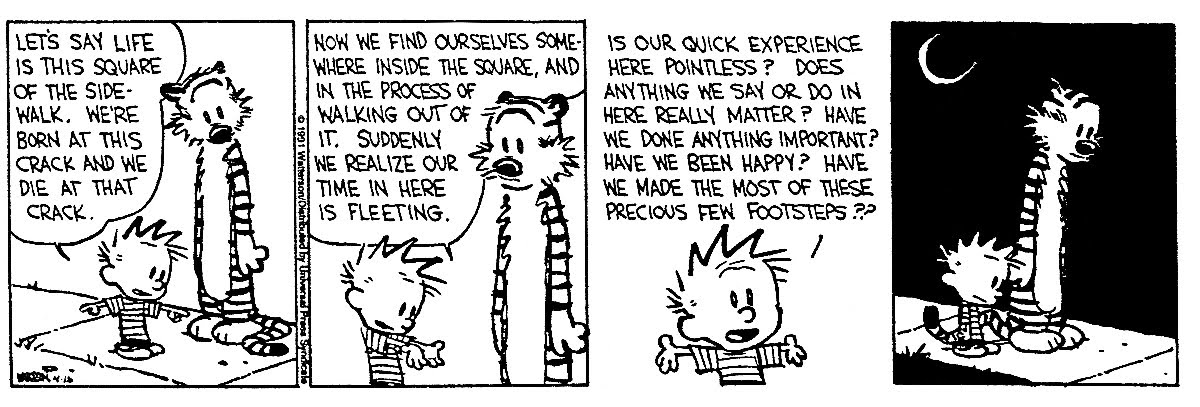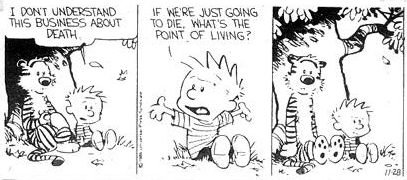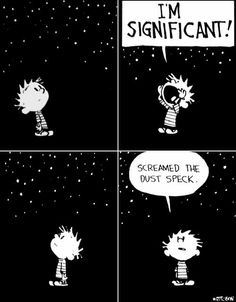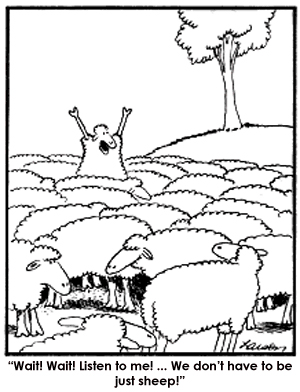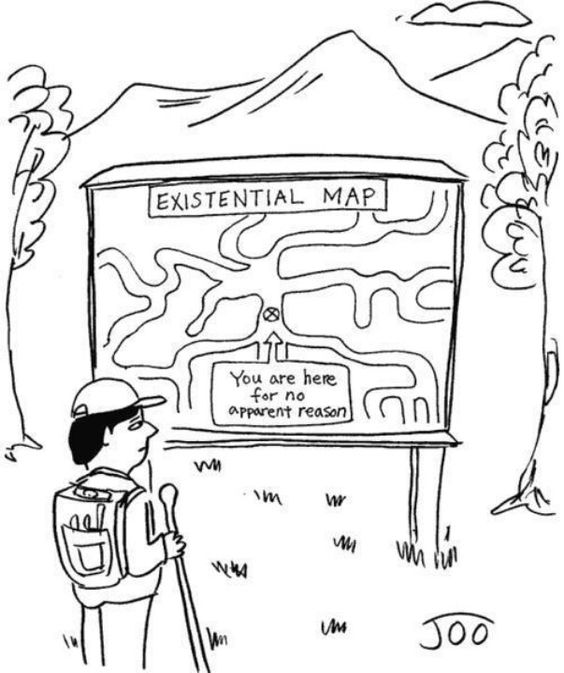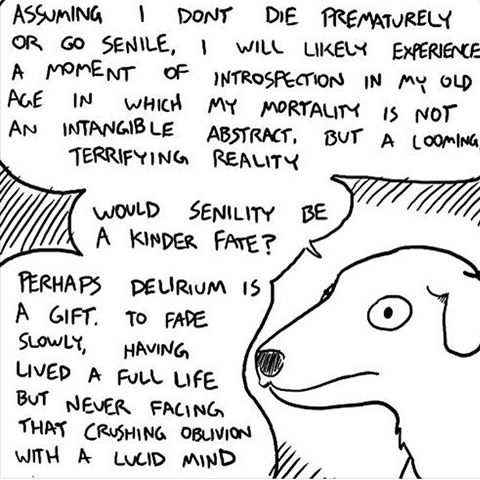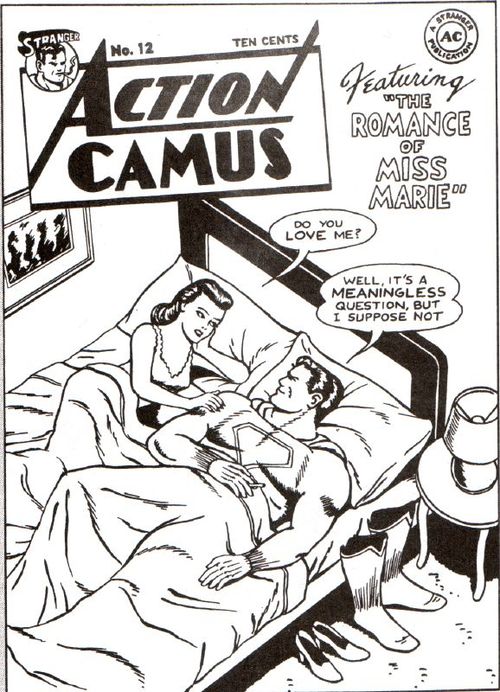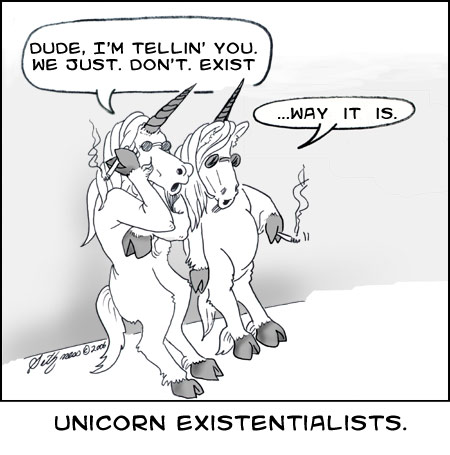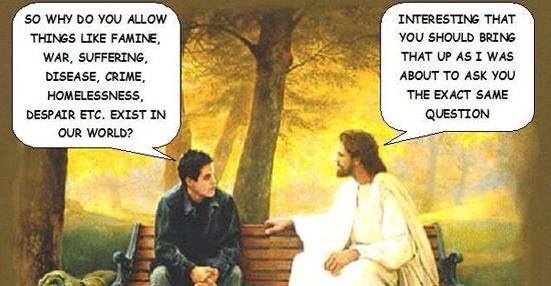|
home | what's new | other sites | contact | about |
||||
|
Word Gems exploring self-realization, sacred personhood, and full humanity
Existentialism & Purpose
“If we possess a why of life we can put up with almost any how.” Friedrich Nietzsche
Editor's 1-Minute Essay: Existentialsim Editor's Essay: What We Stay Alive For Sabahat Fida: Metamorphosis: The World As Chrysalis Of Soul
the boreal forest, the most northerly treeline, at the top of the world
Woody Allen: “I took a test in Existentialism. I left all the answers blank and got 100.” Betty Friedan, The Feminine Mystique: “Each suburban wife struggles with it alone. As she made the beds, shopped for groceries, matched slipcover material, ate peanut butter sandwiches with her children, chauffeured Cub Scouts and Brownies, lay beside her husband at night- she was afraid to ask even of herself the silent question-- 'Is this all?” Hermann Hesse: “I realize today that nothing in the world is more distasteful to a man than to take the path that leads to himself.”
Bertrand Russell: “Some care is needed in using Descartes' argument. 'I think, therefore I am' says rather more than is strictly certain. It might seem as though we are quite sure of being the same person to-day as we were yesterday, and this is no doubt true in some sense. But the real Self is as hard to arrive at as the real table, and does not seem to have that absolute, convincing certainty that belongs to particular experiences.” Bertrand Russell: “All the labor of all the ages, all the devotion, all the inspiration, all the noonday brightness of human genius are destined to extinction. So now, my friends, if that is true, and it is true, what is the point?”
Stanley Kubrick: “If man merely sat back and thought about his impending termination, and his terrifying insignificance and aloneness in the cosmos, he would surely go mad, or succumb to a numbing sense of futility. Why, he might ask himself, should he bother to write a great symphony, or strive to make a living, or even to love another, when he is no more than a momentary microbe on a dust mote whirling through the unimaginable immensity of space? Those of us who are forced by their own sensibilities to view their lives in this perspective — who recognize that there is no purpose they can comprehend and that amidst a countless myriad of stars their existence goes unknown and unchronicled — can fall prey all too easily to the ultimate anomie. The world's religions, for all their parochialism, did supply a kind of consolation for this great ache.” Simone de Beauvoir: “As long as there have been men and they have lived, they have all felt this tragic ambiguity of their condition, but as long as there have been philosophers and they have thought, most of them have tried to mask it.”
Jules Renard: “Paradise does not exist, but we must nonetheless strive to be worthy of it.” Friedrich Nietzsche: “No one is accountable for existing at all, or for being constituted as he is, or for living in the circumstances and surroundings in which he lives. The fatality of his nature cannot be disentangled from the fatality of all that which has been and will be. He is not the result of a special design, a will, a purpose; he is not the subject of an attempt to attain an 'ideal of man' or an 'ideal of happiness' or an 'ideal of morality'--it is absurd to want to hand over his nature to some purpose or other. We invented the concept 'purpose': in reality purpose is lacking...One is necessary, one is a piece of fate, one belongs to the whole, one is in the whole--there exists nothing which could judge, measure, compare, condemn our being, for that would be to judge, measure, condemn the whole...”
Jane Hamilton: “Sometimes I couldn't figure it out, what all the living was for.” Tiffany Madison: “Perhaps the Creator of this strange place knows us better than we know ourselves. Perhaps humanity was meant to eternally ponder the purpose and importance of our own existence. If we were assured of either, we’d be intolerable creatures.” Arthur Schopenhauer: “If the immediate and direct purpose of our life is not suffering then our existence is the most ill-adapted to its purpose in the world.” Steven L. Peck: “It seemed funny that one day I would go to bed in her arms and the next not feel anything, like a switch had gone off. But no, that wasn’t honest either. This had been building for a long time. Our silences were getting longer. Our arguments more frequent. How do you stay with someone when there are no dreams to build? No purpose to accomplish? No meaning? No meaning —that was the monster that drove us away from one another in the end. Always.” Friedrich Nietzsche: “if we possess a why of life we can put up with almost any how.” Albert Camus: “The tragedy is not that we are alone, but that we cannot be. At times I would give anything in the world to no longer be connected by anything to this universe of men.”
Viktor E. Frankl: “We had to learn ourselves and, furthermore, we had to teach the despairing men, that it did not really matter what we expected from life, but rather what life expected from us. We need to stop asking about the meaning of life, and instead to think of ourselves as those who were being questioned by life—hourly and daily. Our answer must consist not in talk and meditation, but in right action and in right conduct. Life ultimately means taking the responsibility to find the right answers to its problems and to fulfill the task which it constantly sets for each individual.” Søren Kierkegaard: “Deep within every human being there still lives the anxiety over the possibility of being alone in the world, forgotten by God, overlooked among the millions and millions in this enormous household. One keeps this anxiety at a distance by looking at the many round about who are related to him as kin and friends, but the anxiety is still there, nevertheless, and one hardly dares think of how he would feel if all this were taken away.” Goethe: “What matters creative endless toil, When, at a snatch, oblivion ends the coil?” W. Somerset Maugham, The Painted Veil: “Supposing there is no life everlasting. Think what it means if death is really the end of all things. They've given up all for nothing. They've been cheated. They're dupes." Waddington reflected for a little while. "I wonder if it matters what they have aimed at is illusion. Their lives are in themselves beautiful. I have an idea that the only thing which makes it possible to regard this world we live in without disgust is the beauty which now and then men create out of the chaos. The pictures they paint, the music they compose, the books the write, and the lives they lead. Of all these the richest beauty is the beautiful life. That is the perfect work of art.” Ernest Becker: “the best existential analysis of the human condition leads directly into the problems of God and faith."
Alexander McCall Smith: "These French people said that you should just live in a way which made you feel real, and that the real thing to do was the right thing too." Tatsuhiko Takimoto: “Take fireflies for example. Try to imagine their beauty, the evanescent beauty of their lives, which don't even last a week. Female fireflies flash their lights only to have intercourse with the males; males twinkle just to have intercourse with the females. And once their mating has finished, they die. In short, their reproductive instinct is the single, absolute reason for fireflies to live. In that simple instinct and their simple world, no kind of sadness can intervene. This is precisely why fireflies are so fleetingly beautiful.” William James: “The question of being is the darkest in all philosophy.” Jeanette Winterson, The Stone Gods: “I kissed her and forgot death.” Albert Camus: “Let's not worry. It's too late now. It will always be too late, fortunately!” Simone de Beauvoir: “I was still keenly aware as in my childhood of the inexplicable nature of my presence here on earth; where had I come from here; where was I going? I often thought about these things with a kind of stupefied horror and used to fill my diary with long self-communings.” Faiz Shaikh: “They say I don’t exist. They say I am an extension, an indulgence, imagination of a schizophrenic person.” Simone de Beauvoir: “Yet I loathe the thought of annihilating myself quite as much now as I ever did. I think with sadness of all the books I’ve read, all the places I’ve seen, all the knowledge I’ve amassed and that will be no more. All the music, all the paintings, all the culture, so many places: and suddenly nothing. ... If it had at least enriched the earth; if it had given birth to… what? A hill? A rocket? But no. Nothing will have taken place. I can still see the hedge of hazel trees flurried by the wind and the promises with which I fed my beating heart while I stood gazing at the gold-mine at my feet: a whole life to live. The promises have all been kept. And yet, turning an incredulous gaze towards that young and credulous girl, I realise with stupor how much I was gypped.” Fyodor Dostoyevsky: “Perhaps it was because a terrible anguish had developed within my soul, occasioned by a circumstance which loomed infinitely larger than my own self: to be precise, it was the dawning conviction that in the world at large, nothing mattered. I had had a presentiment of this for a good long time, but complete conviction came swiftly during this last year. All of a sudden, I realized that it would not matter to me whether the world existed or whether there was nothing at all anywhere. I began to intuit and sense with all my being, that there was nothing around me.” Thomas R. Flynn: “Existentialism is commonly associated with Left-Bank Parisian cafes and the ‘family’ of philosophers Jean-Paul Sartre and Simone de Beauvoir who gathered there in the years immediately following the liberation of Paris at the end of World War II. One imagines offbeat, avant-garde intellectuals, attached to their cigarettes, listening to jazz as they hotly debate the implications of their new-found political and artistic liberty. The mood is one of enthusiasm, creativity, anguished self-analysis, and freedom – always freedom. Though this reflects the image projected by the media of the day and doubtless captures the spirit of the time, it glosses over the philosophical significance of existentialist thought, packaging it as a cultural phenomenon of a certain historical period. That is perhaps the price paid by a manner of thinking so bent on doing philosophy concretely rather than in some abstract and timeless manner. The existentialists’ urge for contemporary relevance fired their social and political commitment. But it also linked them with the problems of their day and invited subsequent generations to view them as having the currency of yesterday’s news. Such is the misreading of existentialist thought that I hope to correct in this short volume. If it bears the marks of its post-war appearance, existentialism as a manner of doing philosophy and a way of addressing the issues that matter in people’s lives is at least as old as philosophy itself. It is as current as the human condition which it examines.”
Duvvuri Subbarao: “At the heart of existentialist philosophy is the premise that all existence is absurd. Life has no meaning and death is the ultimate absurdity, But in the course of this absurd existence, man is forced to make choices, even if those choices may be about absurd issues. But man abhors this freedom of choice, a condition called 'existential angst'. Until we reach a time when most of our life lies behind us, we second guess ourselves interminably. 'What if I had done done this?' 'What if I had done that?' 'Could I have learnt from what others before me have done?' But that is a futile endeavor. It is just not possible to pass on the burden of decision-making to someone else, nor is it possible to learn from other's experiences. Every man has to make choices by falling back on his own experience. In short, man is condemned to be free.” Bangambiki Habyarimana, Pearls Of Eternity: “I wrote a "holy book" as a fun way to test if I could and see if people could believe in it, before long people told me they were seeing visions of the gods and afterlife I had described. People had really strong faith in the scriptures I had written. Of course I insisted they were inspired. And they believed it. You can't imagine how gullible people can be." Albert Camus: “The literal meaning of life is whatever you're doing that prevents you from killing yourself.” Lawrence M. Krauss: “I've told you two things: First, you're much more insignificant than you ever imagined and second, the future is miserable. But you should be happy, because we may live in a universe without purpose but that means the purpose in our lives is the purpose we create. And we should consider ourselves fortunate to have evolved in this place in the middle of nowhere and evolved a consciousness so we can understand the universe from the earliest moments of the big bang to the far future. So instead of being depressed, you should enjoy your brief moment in the sun.” Kilroy J. Oldster: "We are born with a desire to be immortal. Cursed with the knowledge that we must die, people live their orthodox lives out by displaying reckless abandon as to the outcome of human life or nervously hounded by utter despondency nipping their heels. How we resolve this decidedly human complex of carrying out our daily lives while burden by our inescapable mortality determines our essential character. The collation of similar values adopted by our community determines who we are as a people.” Agatha Christie, Miss Marple: “Everything that has existed, lingers in the Eternity.” Søren Kierkegaard: “When I was very young and in the cave of Trophonius I forgot to laugh. Then, when I got older, when I opened my eyes and saw the real world, I began to laugh and I haven’t stopped since. I saw that the meaning of life was to get a livelihood, that the goal of life was to be a High Court judge, that the bright joy of love was to marry a well-off girl, that the blessing of friendship was to help each other out of a financial tight spot, that wisdom was what the majority said it was, that passion was to give a speech, that courage was to risk being fined 10 rix-dollars, that cordiality was to say ‘You’re welcome’ after a meal, and that the fear of God was to go to communion once a year. That’s what I saw. And I laughed.”
Csíkszentmihályi Mihály: “As people move through life, passing from the hopeful ignorance of youth into sobering adulthood, they inevitably face an increasingly nagging question: Is this all there is? Childhood can be painful, adolescence confusing; most people, expect that in adulthood things will get better. During the early years of adulthood the future still looks promising. But inevitably the mirror' shows the first white hairs and confirms the fact that those few extra pounds are not about to leave; eyesight begins to fail and mysterious pains begin to shoot through the body...' Where's all that money I was to have made? Where are all of the good times I was going to have?” Oli Anderson: “I decided to give up meaningless sex, but then I remembered that everything is meaningless.” Raoul Vaneigem: “No more Guernicas, no more Auschwitzes, no more Hiroshimas, no more Setifs. Hooray! But what about the impossibility of living, what about this stifling mediocrity and this absence of passion? What about the jealous fury in which the rankling of never being ourselves drives us to imagine that other people are happy? What about this feeling of never really being inside your own skin?” Milan Kundera: “You certainly remember this scene from dozens of films: a boy and a girl are running hand in hand in a beautiful spring (or summer) landscape. Running, running, running and laughing. By laughing the two runners are proclaiming to the whole world, to audiences in all the movie theaters: 'We're happy, we're glad to be in the world, we're in agreement with being!' It's a silly scene, a cliche, but it expresses a basic human attitude: serious laughter, laughter 'beyond joking.' All churches, all underwear manufacturers, all generals, all political parties, are in agreement about that kind of laughter, and all of them rush to put the image of the two laughing runners on the billboards advertising their religion, their products, their ideology, their nation, their sex, their dishwashing powder.” Jean-Paul Sartre: “You didn't succeed. Well, what of that? There's nothing to prove, you know, and the revolution's not a question of virtue but of effectiveness. There is no heaven. There's work to be done, that's all. And you must do what you're cut out for; all the better if it comes easy to you. The best work is not the work that takes the most sacrifice. It's the work in which you can best succeed.” Arthur K. Flam: “You know, everything's a sort of lie, and then you die.” Philip Roth: “All I can tell you with certainty is that I, for one, have no self, and that I am unwilling or unable to perpetrate upon myself the joke of a self.... What I have instead is a variety of impersonations I can do, and not only of myself — a troupe of players that I have internalised, a permanent company of actors that I can call upon when a self is required.... I am a theater and nothing more than a theater.” Neel Burton: “Facing up to non-being enables us to put our life into perspective, see it in its entirety, and thereby lend it a sense of direction and unity. If the ultimate source of anxiety is fear of the future, the future ends in death; and if the ultimate source of anxiety is uncertainty, death is the only certainty. It is only by facing up to death, accepting its inevitability, and integrating it into life that we can escape from the pettiness and paralysis of anxiety, and, in so doing, free ourselves to make the most out of our lives and out of ourselves.” Aldous Huxley: “But if one doesn't really exist, one wonders why..." she hesitated. "Why one makes such a fuss about things," Anthony suggested. "All that howling and hurrahing and gnashing of teeth. About the adventures of a self that isn't really a self—just the result of a lot of accidents. And of course," he went on, "once you start wondering, you see at once that there is no reason for making such a fuss. And then you don't make a fuss—that is, if you're sensible. Like me," he added, smiling.” Colin Wilson: "I believe like Whitehead that the universe is a single organism that somehow takes account of us. I don't believe that modern man is a stranded fragment of life in an empty universe. I've an instinct that tells me that there's a purpose, and that I can understand that purpose more deeply by trusting my instinct. I can't believe the world is meaningless. I don't expect life to explode in my face at any moment. When I walk back to my cottage, I don't feel like a meaningless fragment of life walking over a lot of dead hills. I feel a part of the landscape, as if it's somehow aware of me, and friendly.” Daniel Younger, Delirious: “This existenitalist stuff sure is crap." James Baldwin: “Life is tragic simply because the earth turns, and the sun inexorably rises and sets, and one day, for each of us, the sun will go down for the last, last time. Perhaps the whole root of our trouble, the human trouble, is that we will sacrifice all the beauty of our lives, will imprison ourselves in totems, taboos, crosses, blood sacrifices, steeples, mosques, races, armies, flags, nations, in order to deny the fact of death, which is the only fact we have. It seems to me that one ought to rejoice in the fact of death – ought to decide, indeed, to earn one’s death by confronting with passion the conundrum of life.”
Jean-Paul Sartre: “Existentialism is no mournful delectation but a humanist philosophy of action, effort, combat, and solidarity. Man must create his own essence: it is in throwing himself into the world, suffering there, struggling there, that he gradually defines say what this man is before he dies, or what mankind is before it has disappeared.” Fernando Pessoa: “I don't complain about the horror of life; I complain about the horror of my life. The only fact I worry about is that I exist and suffer and can't even dream of being removed from my feeling of suffering.” Søren Kierkegaard: “Battle day and night against the guile of oblivion." William Barrett: “Modern Existentialism... is a total European creation, perhaps the last philosophic legacy of Europe to America or whatever other civilization is now on its way to supplant Europe.” Blaise Cendrars: "Why are you trying to make something out of it? And what will you make? what are you looking for? There is no Truth. There's only action, action obeying a million different impulses, ephemeral action, action subjected to every possible and imaginable contingency and contradiction, Life. Life is crime, theft, jealousy, hunger, lies, disgust, stupidity, sickness, volcanic eruptions, earthquakes, piles of corpses. what can you do about it, my poor friend?”
Franz Kafka: “Life is merely terrible; I feel it as few others do. Often — and in my inmost self perhaps all the time — I doubt whether I am a human being.” Norman Mailer, Naked and the Dead: "I hate everything which is not in myself." David Mitchell: “After ten pages I felt that Nietzsche was reading me, not I him.”
|
||||
|
|
